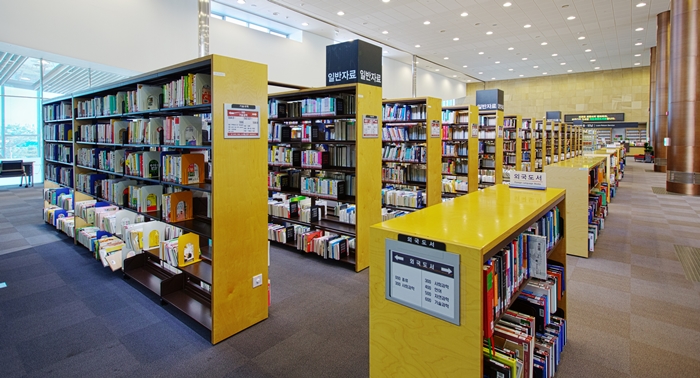
The Presidential Committee on Library and Information Policy on Jan. 23 announced its third comprehensive plan for library development from 2019-23. The photo above shows collections at the National Library of Korea in Sejong Special Autonomous City. (National Library of Korea)
By Lee Kyoung Mi and Kim Young Shin
|
In 2023, Jane Doe, a pregnant woman living in Seoul who has a daughter, visits her nearby library on weekends. There, an artificial intelligence (AI) device recommends to her books about childbirth and infant care, and she can choose from numerous parenting programs. Though with a child, she can fully enjoy her time there thanks to the family-friendly environment.
John Doe, a farmer living in a rural area, goes to a public library that was just opened in his town. He attends there a coding class for senior citizens that has helped him set up his own online shop to sell his crops. He is expected to earn more money thanks to this venture. |
The Presidential Committee on Library and Information Policy on Jan. 23 announced its third comprehensive plan for the innovative development of public libraries to attract more people and provide customized information by 2023.
The libraries will offer customized programs for visitors like those of education, which will provide residents with the practical knowledge needed to live in the era of the Fourth Industrial Evolution. Social reading clubs run by libraries will also feature intellectual debates.
Committee chairman Shin Ki-nam said, "We will push forward with new policies to substantially develop public libraries to allow them to become the core of the (administration's vision of an) 'inclusive nation.'"
For those unable to visit a library during operating hours, an expanded range of digital data will be offered online. AI technology will be applied to the library operating system to recommend relevant information to visitors according to life stage such as data on job openings, childrearing and welfare for senior citizens.
Facility renovation will make libraries more "inclusive" to attract more people from the community and reduce knowledge inequality caused by the nation’s rapidly aging society and constant technological advancement.
More access to libraries will be offered to people living in isolated conditions such as soldiers, patients and prison inmates. Additionally, universal designs will be applied to facilities for people with physical difficulties such as the disabled, elderly, pregnant women and parents of infants or toddlers.
The number of public libraries will be increased to 1,468 and that of small libraries to 6,820 by 2023, up from 1,042 and 6,058 now, respectively.
km137426@korea.kr